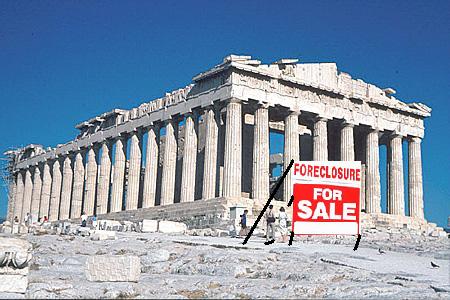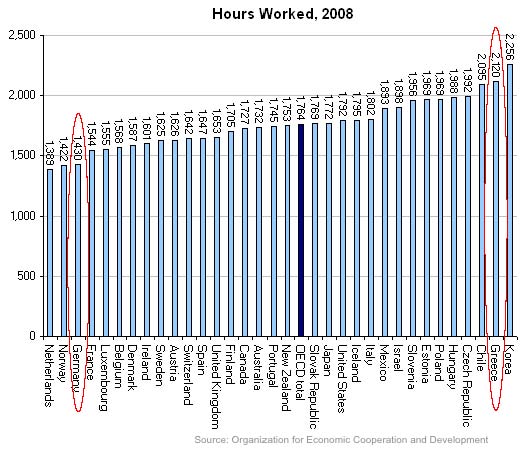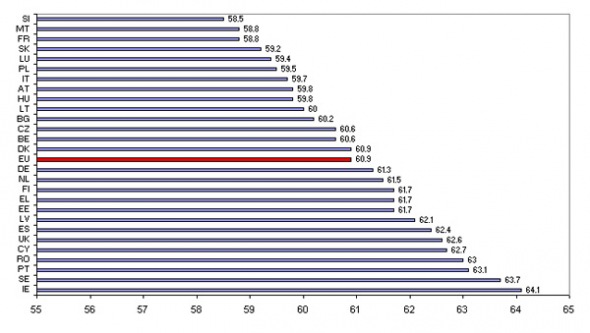Democracy vs Mythology: The Battle in Syntagma Square
21 Ιουνίου 2011
I have never been more desperate to explain and more hopeful for your understanding of any single fact than this: The protests in Greece concern all of you directly.
What is going on in Athens at the moment is resistance against an invasion; an invasion as brutal as that against Poland in 1939. The invading army wears suits instead of uniforms and holds laptops instead of guns, but make no mistake – the attack on our sovereignty is as violent and thorough. Private wealth interests are dictating policy to a sovereign nation, which is expressly and directly against its national interest. Ignore it at your peril. Say to yourselves, if you wish, that perhaps it will stop there. That perhaps the bailiffs will not go after the Portugal and Ireland next. And then Spain and the UK. But it is already beginning to happen. This is why you cannot afford to ignore these events.
The powers that be have suggested that there is plenty to sell. Josef Schlarmann, a senior member of Angela Merkel’s party, recently made the helpful suggestion that we should sell some of our islands to private buyers in order to pay the interest on these loans, which have been forced on us to stabilise financial institutions and a failed currency experiment. (Of course, it is not a coincidence that recent studies have shown immense reserves of natural gas under the Aegean sea).
China has waded in, because it holds vast currency reserves and more than a third are in Euros. Sites of historical interest like the Acropolis could be made private. If we do not as we are told, the explicit threat is that foreign and more responsible politicians will do it by force. Let’s make the Parthenon and the ancient Agora a Disney park, where badly paid locals dress like Plato or Socrates and play out the fantasies of the rich.
It is vital to understand that I do not wish to excuse my compatriots of all blame. We did plenty wrong. I left Greece in 1991 and did not return until 2006. For the first few months I looked around and saw an entirely different country to the one I had left behind. Every billboard, every bus shelter, every magazine page advertised low interest loans. It was a free money give-away. Do you have a loan that you cannot manage? Come and get an even bigger loan from us and we will give you a free lap-dance as a bonus. And the names underwriting those advertisements were not unfamiliar: HSBC, Citibank, Credit Agricole, Eurobank, etc.
Regretfully, it must be admitted that we took this bait “hook, line and sinker”. The Greek psyche has always had an Achilles’ heel; an impending identity crisis. We straddle three Continents and our culture has always been a melting pot reflective of that fact. Instead of embracing that richness, we decided we were going to be definitively European; Capitalist; Modern; Western. And, damn it, we were going to be bloody good at it. We were going to be the most European, the most Capitalist, the most Modern, the most Western. We were teenagers with their parents’ platinum card.
I did not see a pair of sunglasses not emblazoned with Diesel or Prada. I did not see a pair of flip-flops not bearing the logo of Versace or D&G. The cars around me were predominantly Mercedes and BMWs. If anyone took a holiday anywhere closer than Thailand, they kept it a secret. There was an incredible lack of common sense and no warning that this spring of wealth may not be inexhaustible. We became a nation sleepwalking toward the deep end of our newly-built, Italian-tiled swimming pool without a care that at some point our toes may not be able to touch the bottom.
That irresponsibility, however, was only a very small part of the problem. The much bigger part was the emergence of a new class of foreign business interests ruled by plutocracy, a church dominated by greed and a political dynasticism which made a candidate’s surname the only relevant consideration when voting. And while we were borrowing and spending (which is affectionately known as “growth”), they were squeezing every ounce of blood from the other end through a system of corruption so gross that it was worthy of any banana republic; so prevalent and brazen that everyone just shrugged their shoulders and accepted it or became part of it.
I know it is impossible to share in a single post the history, geography and mentality which has brought this most beautiful corner of our Continent to its knees and has turned one of the oldest civilisations in the world from a source of inspiration to the punchline of cheap jokes. I know it is impossible to impart the sense of increasing despair and helplessness that underlies every conversation I have had with friends and family over the last few months. But it is vital that I try, because the dehumanisation and demonisation of my people appears to be in full swing.
So let me deal with some of that media Mythology
Greeks are lazy
This underlies much of what is said and written about the crisis, the implication presumably being that our lax Mediterranean work-ethic is at the heart of our self-inflicted downfall. And yet, OECD data among its members show that in 2008, Greeks worked on average 2120 hours a year. That is 690 hours more than the average German, 467 more than the average Brit and 356 more than the OECD average. Only Koreans work longer hours. Further, the paid leave entitlement in Greece is on average 23 days, lower than most EU countries including the UK’s minimum 28 and Germany’s whopping 30.
Greeks retire early
The figure of 53 years old as an average retirement age is being bandied about. So much, in fact, that it is being seen as fact. The figure actually originates from a lazy comment on the NY Times website. It was then repeated by Fox News and printed on other publications. Greek civil servants have the option to retire after 17.5 years of service, but this is on half benefits. The figure of 53 is a misinformed conflation of the number of people who choose to do this (in most cases to go on to different careers) and those who stay in public service until their full entitlement becomes available. Looking at Eurostat’s data from 2005 the average age of exit from the labour force in Greece (indicated in the graph below as EL for Ellas) was 61.7; higher than Germany, France or Italy and higher than the EU27 average. Since then Greece have had to raise the minimum age of retirement twice under bail-out conditions and so this figure is likely to rise further.
Greece is a weak economy that should never have been a part of the EU
One of the assertions frequently levelled at Greece is that its membership to the European Union was granted on emotional “cradle of democracy” grounds. This could not be further from the truth. Greece became the first associate member of the EEC outside the bloc of six founding members (Germany, France, Italy and the Benelux countries) in 1962, much before the UK. It has been a member of the EU for 30 years. It is classified by the World Bank as a “high income economy” and in 2005 boasted the 22nd highest human development and quality of life index in the world – higher than the UK, Germany or France. As late as 2009 it had the 24th highest per capita GDP according to the World Bank. Moreover, according to the University of Pennsylvania’s Centre for International Comparisons, Greece’s productivity in terms of real GDP per person per hour worked, is higher than that of France, Germany or the US and more than 20% higher than the UK’s.
The first bail-out was designed to help Greek people, but unfortunately failed.
It was not. The first bail-out was designed to stabilise and buy time for the Eurozone. It was designed to avoid another Lehman-Bros-type market shock, at a time when financial institutions were too weak to withstand it. In the words of BBC economist Stephanie Flanders: “Put it another way: Greece looks less able to repay than it did a year ago – while the system as a whole looks in better shape to withstand a default… From their perspective, buying time has worked for the eurozone. It just hasn’t been working out so well for Greece.” If the bail-out were designed to help Greece get out of debt, then France and Germany would not have insisted on future multi-billion military contracts. As Daniel Cohn-Bendit, the MEP and leader of the Green group in the European Parliament, explained: “In the past three months we have forced Greece to confirm several billion dollars in arms contracts. French frigates that the Greeks will have to buy for 2.5 billion euros. Helicopters, planes, German submarines.”
The second bail-out is designed to help Greek people and will definitely succeed.
I watched as Merkel and Sarkozy made their joint statement yesterday. It was dotted with phrases like “Markets are worried”, “Investors need reassurance” and packed with the technical language of monetarism. It sounded like a set of engineers making minor adjustments to an unmanned probe about to be launched into space. It was utterly devoid of any sense that at the centre of what was being discussed was the proposed extent of misery, poverty, pain and even death that a sovereign European partner, an entire nation was to endure. In fact most commentators agree, that this second package is designed to do exactly what the first one did: buy more time for the banks, at considerable expense to the Greek people. There is no chance of Greece ever being able to repay its debt – default is inevitable. It is simply servicing interest and will continue to do so in perpetuity.
And the biggest myth of them all: Greeks are protesting because they want the bail-out but not the austerity that goes with it
This is a fundamental untruth. Greeks are protesting because they do not want the bail-out at all. They have already accepted cuts which would be unfathomable in the UK – think of what Cameron is doing and multiply it by ten. Benefits have not been paid in over six months. Basic salaries have been cut to 550 Euros (£440) a month.
My mother, who is nearly 70, who worked all her life for the Archaeology Department of the Ministry of Culture, who paid tax, national insurance and pension contributions for over 45 years, deducted at the source (as they are for the vast majority of decent hard-working people – it is the rich that can evade), has had her pension cut to less than £400 a month. She faces the same rampantly inflationary energy and food prices as the rest of Europe.
A good friend’s grandad, Panagiotis K., fought a war 70 years ago – on the same side as the rest of Western democracy. He returned and worked 50 years in a shipyard, paid his taxes, built his pension. At the age of 87 he has had to move back to his village so he can work his “pervoli” – a small arable garden – planting vegetables and keeping four chickens. So that he and his 83 year old wife might have something to eat.
A doctor talking on Al Jazeera yesterday explained how even GPs and nurses have become so desperate that they ask people for money under the table in order to treat them, in what are meant to be free state hospitals. Those who cannot afford to do this, go away to live with their ailment, or die from it. The Hippocratic oath violated out of despair, at the place of its inception.
So, the case is not that Greeks are fighting cuts. There is nothing left to cut. The IMF filleting knife has gotten to pure, white, arthritis-afflicted bone. The Greeks understand that a second bail-out is simply “kicking the can down the road”. Greece’s primary budget deficit is, in fact, under 5bn Euros. The other 48bn Euros are servicing the debt, including that of the first bail-out, with one third being purely interest. The EU, ECB and IMF now wish to add another pile of debt on top of that, which will be used to satisfy interest payments for another year. And the Greeks have called their bluff. They have said “Enough is enough. Keep your money.”
____________________________________________________________
My land has always attracted aggressive occupiers. Its vital strategic position combined with its extraordinary natural beauty and history, have always made it the trinket of choice for the forces of evil. But we are a tenacious lot. We emerged after 400 years of Ottoman occupation, 25 generations during which our national identity was outlawed with penalty of death, with our language, tradition, religion and music intact.
Finally, we have woken up and taken to the streets. My sister tells me that what is happening in Syntagma Square is beautiful; filled with hope; gloriously democratic. A totally bi-partisan crowd of hundreds of thousands of people have occupied the area in front of our Parliament. They share what little food and drink there is. A microphone stands in the middle, on which anyone can speak for two minutes at a time – even propose things which are voted by a show of thumbs. Citizenship.
And what they say is this: We will not suffer any more so that we can make the rich, even richer. We do not authorise any of the politicians, who failed so spectacularly, to borrow any more money in our name. We do not trust you or the people that are lending it. We want a completely new set of accountable people at the helm, untainted by the fiascos of the past. You have run out of ideas.
Wherever in the world you are, their statement applies.
Money is a commodity, invented to help people by facilitating transactions. It is not wealth in itself. Wealth is natural resources, water, food, land, education, skill, spirit, ingenuity, art. In those terms, the people of Greece are no poorer than they were two years ago. Neither are the people of Spain or Ireland or the UK. And yet, we are all being put through various levels of suffering, in order for numbers (representing money which never existed) to be transferred from one column of a spreadsheet to another.
This is why the matter concerns you directly. Because this is a battle between our right to self-determine, to demand a new political process, to be sovereign, and private corporate interests which appear determined to treat us like a herd, which only exists for their benefit. It is the battle against a system which ensures that those who fuck up, are never those that are punished – it is always the poorest, the most decent, the most hard-working that bear the brunt. The Greeks have said “Enough is enough”. What do you say?
____________________________________________________________
Help us by spreading this message to others – don’t let the media airbrush it out of existence, like they have done with the people of Madison, Wisconsin and the Indignados in Spain. Use the comments below (no registration is needed) to express your solidarity with the people of Greece. If you have any questions, again use the comments and I will do my best to answer. Raise the matter with people in power. Ask questions. Talk about it in the pub. Most of all, wake up before you find yourself in our situation.
Nassim Nicholas Taleb is the Lebanese-American philosopher who formulated the theory of “Black Swan Events” – unpredictable, unforeseen events which have a huge impact and can only be explained afterwards. Last week, on Newsnight, he was asked by Jeremy Paxman whether the people taking to the streets in Athens was a Black Swan Event. He replied: “No. The real Black Swan Event is that people are not rioting against the banks in London and New York.”
Source: http://sturdyblog.wordpress.com/2011/06/18/democracy-vs-mythology-the-battle-in-syntagma-square/








